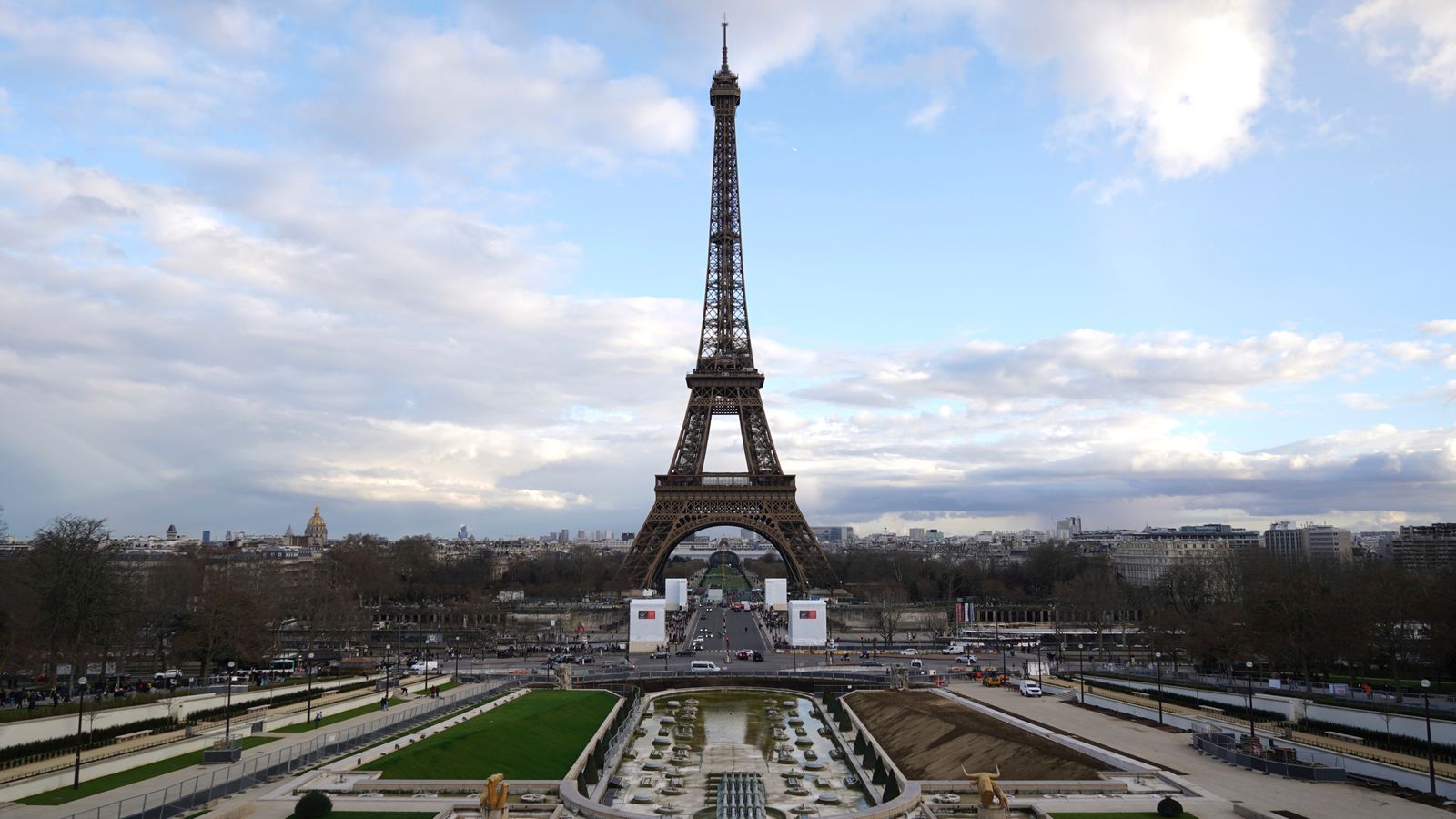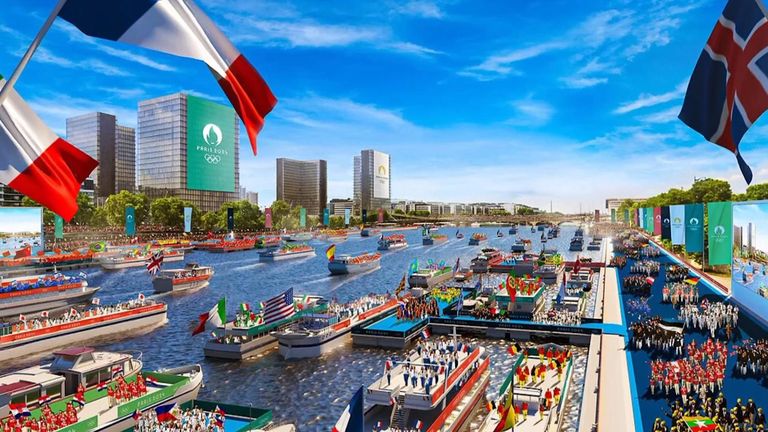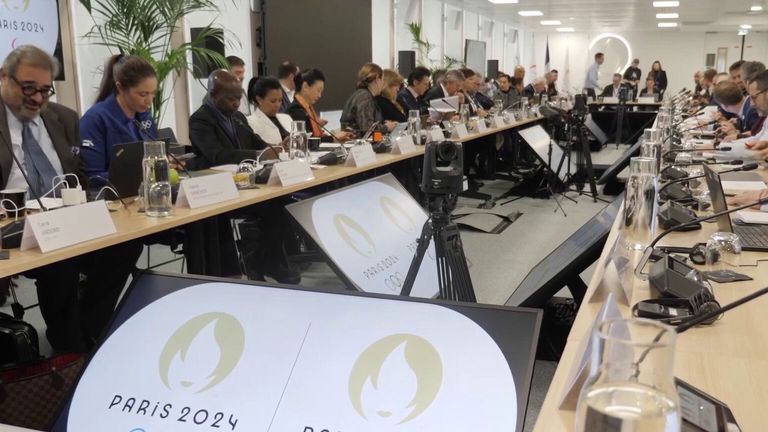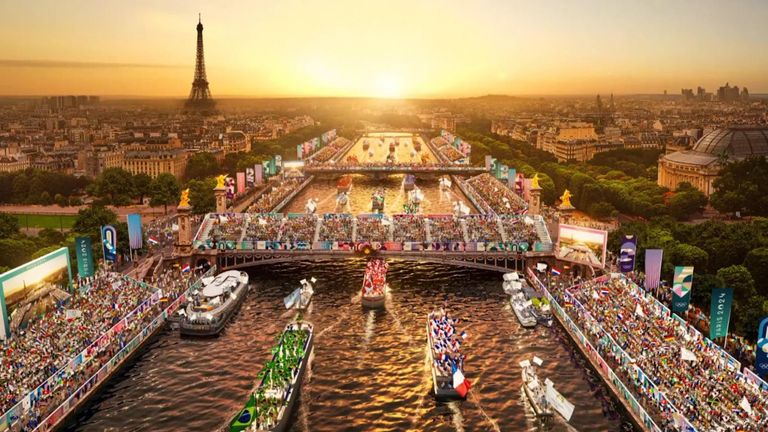Paris Olympics: Opening ceremony could be scaled back over security fears


The ambitious Paris opening ceremony plans could be scaled back further due to security concerns, the Olympic chief managing the event has told Sky News.
But Olympic Games executive director Christophe Dubi insisted they want to preserve the spectacular, unique parade by athletes down the River Seine while not risking their safety.
Mr Dubi was speaking as the French government ordered new restrictions on the crowd for the 26 July extravaganza – with tickets no longer freely available to the public but by invitation only.
“You can adapt according to the level of risk,” Mr Dubi told Sky News at Paris 2024 HQ.
“So depending on the nature of the threat, of course this can be further reduced if need be… and it was addressing an underlying question, which is ‘can we revert back to another location, say, a stadium somewhere?’
“You cannot plan for a Plan B. It’s far too big, too sophisticated, too complex artistically to look at a Plan B in another location. Plan B is reducing, adjusting, but it is that location.”
Even with a downsized crowd, the Paris opening ceremony will be like none before it.
There will still be more than 300,000 watching officially from the side of the Seine and thousands more on balconies to glimpse the 94 boats sending thousands of athletes down the river.
There will be an unprecedented closure of the airports and airspace for a 150km radius throughout the ceremony.
Advertisement
The International Olympic Committee (IOC) used to avoid talk of alternative plans until the pandemic, when the Tokyo Games were postponed until 2021.
“It showed the world that you’d better have a Plan B and a lot of determination,” Mr Dubi said.
Global conflicts and geopolitical tensions have increased the threat – on the ground, online and from the skies.
Please use Chrome browser for a more accessible video player

2:55
Security fears over Paris Olympics
“Drones currently can be used as weapons, of course, and there is a whole plan that is developed by the ministry and it’s a very sophisticated one to meet with the challenge,” Mr Dubi said.
“But, also, what the people we have with us this morning are doing is to leave no stone unturned and looking everywhere there is a threat. And that’s what security planning is about.”
Mr Dubi was speaking after the final gathering before the Games of the IOC’s Coordination Commission.
Sky News was granted exclusive access to part of the boardroom meeting of the commission, which features representatives from the IOC, sports, athletes and the local organising committee.
“There is still a lot of work indeed” was the early message delivered by one official to the group.
While there is only the Aquatics Centre still to be opened, final planning involved a tour of the Olympic Village to check where athletes will stay and keeping a close check on those security plans.

Mr Dubi stressed to Sky News that “safety and security” is “first in any of the conversations”.
“The cyber environment in the world for anyone… has become absolutely critical,” he said.
“Do we plan for cyber security? Absolutely. And is it at the level of the organising committee and going back up to the state being involved? Absolutely.”
The fraught geopolitical climate just heightens the risk.
Russia is aggrieved at being banned from competing as a team in Paris after its full-scale invasion of Ukraine in 2022, although some of its athletes can compete as neutrals.
There will be Israeli – and potentially Palestinian – competitors too. The Israel-Hamas conflict is set to heighten tensions around the Games.
An Israeli swimmer was booed by the crowd at the World Aquatics Championships in Qatar last month after winning silver.
Read more:
Olympic and Paralympic medals featuring chunks of Eiffel Tower
Cricket could be included at the Olympics for the first time since 1900
There are greater freedoms for activism now at the Olympics, but the IOC is hoping for a sporting celebration rather than an event that sparks further divisions.
“The Games is the international community coming together as one,” Mr Dubi said.
“And as much as possible to give the message of unity and peace can be dominant over any others.”